Jack Breslin Center | East Lansing, MI | Tip: 6 P.M. CT | TV: ESPN2 Tom Izzo and Rick Barnes see each other so often, it sometimes seems like they’re in the same conference. The two coaches — who have a combined 877 wins between them — have met in each of the last four seasons, and they will renew their inter-conference rivalry once more when Michigan State and Texas face off in East Lansing tonight.
Tom Izzo has built a dynasty in East Lansing The five-year streak began in Madison Square Garden, where Drew Neitzel hit a last-second, game-winning shot in 2006 against a young Texas team led by a budding superstar named Kevin Durant. The Spartans also won the next two match-ups, which were played on the neutral NBA courts of the Rockets and Pistons. Last year, the series moved to an on-campus home-and-home set-up, with the Longhorns finally pulling out a win, 79-68, over a Spartan team that eventually made the Final Four. Tonight’s game looks like another classic in this new rivalry, with both teams boasting high rankings and high expectations. The Spartans were slotted as high as 2nd in the nation in pre-season polls, but have suffered a trio of losses against very talented teams, all of which are currently ranked in the top ten. Tonight, Michigan State is hoping to add another signature win to their tournament résumé, which already includes a neutral-court win over Washington in Maui. By the numbers The Spartans have been excellent on offense so far this year, with an efficiency mark of 1.12 points per possession, good for 28th in the nation. They are most effective when the team is in motion, as the Spartans love to misdirect with screens and ball movement guiding the defense one way, while one of their excellent shooters curls around to the weak side for an open look. Unfortunately, Michigan State has also had some long stretches of stagnant offense this season. When they aren’t moving around off the ball, the team tends to settle for outside shots. Against the tougher defenses they’ve faced this year, such as Syracuse’s patented 2-3 zone and Duke’s intense ball pressure beyond the perimeter, the Spartans tend to dribble the air out of the ball or simply pass it around the perimeter. The team is full of excellent shooters, but they have the most success when their looks come off of ball movement and slashing attacks, not when they simply settle for long-range jumpers. The Spartans also had difficulty this year when Washington blitzed their ball screens in Maui. Guard Korie Lucious is just 5’11”, while starting point guard Kalin Lucas is 6’1″. With the extra length provided by Washington’s big men surging past the screen, the Husky double teams gave the Spartan guards fits. The Longhorns would be wise to do the same thing a few times tonight.
The Spartans have turnover issues Typically, the Spartans are a dominant rebounding team. In fact, Michigan State led the NCAA in rebounding each of the last two seasons. This year, though, they look like mere mortals on the glass. The Spartans were outrebounded by eight in their loss to Syracuse, and finished even on the boards with UConn in that loss. Despite having an “off” year on the glass, the Spartans are still very good at cleaning up their misses. So far this season, they are snagging 36.7% of offensive rebounding opportunities. Texas gave up a few easy putbacks in the second half against North Carolina on Saturday, so they need to learn from that and get a body on the Spartan rebounders when the shot is in the air. Perhaps the biggest issue facing Tom Izzo’s team this year is ball control. They are averaging 16.2 turnovers per game, which equates to a miscue on 23% of their possessions. That turnover rate puts the team in the bottom third of Division I basketball for that metric. In all three Spartan losses this year, they had a turnover rate of greater than 23%, including a frustrating 26.9% mark in the loss at Duke. Meet the Spartans Michigan State has an experienced roster, so many faces will be familiar to Longhorn fans. In addition to the solid core of returning Spartans, there’s also a handful of highly-talented freshman who are already giving Coach Izzo quality contributions. Senior swingman Durrell Summers is leading the team with 15.5 points per game so far this year, thanks in large part to his excellent stroke from long range. Summers is hitting 45.6% of his three-point attempts this season, so the Longhorns have to keep an eye on him when he’s hanging out on the weak side of the court. He’s also a solid rebounding guard, pulling down nearly five boards a night.
Kalin Lucas knows how to get to the rim The aforementioned Kalin Lucas is yet another three-point threat for the Spartans, but he’s also able to attack and get to the rim at a moment’s notice. He tore his left Achilles tendon in the second round of last season’s NCAA tournament, so he is still working to get back to 100%. Even with the injury hampering his explosive first step, Lucas is one of the quickest guards in college basketball, and he’ll blow right past the Longhorns if they are playing too tight in an effort to limit his threes. Although Draymond Green isn’t leading the team in scoring with his 12.5 points per game, he’s the team’s most important player. He leads the team with nine rebounds a game, is tops in total assists with 45, and his 14 blocks are just one shy of the team leader. He’s the Spartans’ top steal man by a wide margin, swiping it twice per game, and is even 50% from behind the arc on his 28 attempts this year. Last season, Green was the obvious choice for the Big 10’s Sixth Man of the Year Award, and he’s well on his way to securing that honor again this season. Although Coach Izzo has used him in the starting lineup in six of the team’s first 11 games, he’s still just as productive coming off the bench. There is simply no way the Longhorns will shut Green down tonight, so they can only hope to limit his impact on the game. Forward Delvon Roe is the man who has one more block than Green, and he’s also chipping in seven points and 5.1 rebounds each game. He’s not a flashy player or a bona fide superstar, but he gives the Spartans a junkyard dog in the paint who knows how to get to the basketball. He’s also a very good free-throw shooter for a big man, knocking down nearly 75% of his attempts this season. Sophomore Garrick Sherman has started every game at center for the Spartans, and it’s clear that his offensive game improved tremendously in the off-season. He now has a handful of quality moves that he can use on the blocks, but still needs to put on weight if he’s going to body up down low. He gets pushed around far too often when trying to establish rebounding position, so Tristan Thompson and Gary Johnson will need to take advantage of that weakness tonight. Korie Lucious has come off the bench in all 10 of his games this season, but he’s still the fourth-busiest player and fourth-highest scorer on the team with 24 minutes and nearly eight points a night. While Green leads the team in total assists, Lucious’ 4.2 per-game average is slightly higher. The junior can man the point when Lucas is on the bench, but he has the aggressive mindset of a scoring guard. He loves to isolate and take his man off the dribble, and quite often is the only player trying to attack the rim when the Spartans are going through one of their stagnant offensive stretches. He’s a fair three-point shooter, sinking 32.6% of his attempts so far, but on a Spartan team with much better long-range gunners, that’s not his primary role. Freshman guard Keith Appling will likely be the point guard of the future for Michigan State, but for now he is performing well as the team’s back-up shooting guard. He was named Mr. Basketball in Michigan as a high school senior last year, averaging 28 points per game. Appling is one of the team’s most efficient players, scoring 6.5 points a night in just 16 minutes. He’s deadly when he chooses to shoot the triple, with an eye-popping success rate of 47.8% so far this season. When Appling makes it to the line, he’s even more impressive, having missed just once in 15 tries so far.
Derrick Nix is having a tough year Joining Appling as a backcourt reserve is former walk-on Austin Thornton. The junior has actually started five games on the wing for the Spartans, but has been relegated to the bench as of late. Izzo is high on Thornton’s shooting ability, but so far he has struggled this season, making less than 32% of his threes. Often, Thornton looks nervous when the ball gets in his hands, and he tends to rush things. Defensively, he’s a quality option to guard opposing wings or smaller power forwards, and he buys into Coach Izzo’s active defensive philopshophy. In the frontcourt, Derrick Nix remains a project in his sophomore season. He struggled with weight loss issues last year and didn’t accompany the team to Maui, reportedly for failing to commit to the team. After the Spartans struggled with Chaminade and lost to Connecticut, Nix was quoted as saying he felt like he let his teammates down, and he soon rejoined the roster. Unfortunately, Nix still isn’t in very good shape, and he has a long way to go before he’ll be a significant contributor. He can’t move quickly enough to be of any use on pick and rolls, and his lack of speed makes him a huge liability in transition. One player benefitting from Nix’s struggles is freshman Adreian Payne. He’s incredibly athletic for a 6’10” guy, but is still too undersized to be a star post player in the physical Big 10. For now, his incredible length and surprising hops make him a naturally-talented defender who is giving the team nearly 10 minutes and more than three rebounds per game. Senior guard Mike Kebler will likely play only a couple of minutes tonight, but he earns a mention for the career outing he had against Prairie View A&M on Saturday. Kebler was averaging just 4.4 minutes and 0.6 points per game as a sparingly-used reserve, but he had the game of his life against the Panthers, scoring eight points in 15 minutes of action. Keys to the game
The Spartan defense is suffocating For the Longhorns, the most important thing tonight will be an ability to win the rebounding battle, and they must do exceptionally well on the offensive glass. The Spartans have a correlation of 0.81 between their defensive rebounding percentage and their defensive efficiency. In layman’s terms, that means the Spartan defense is very, very reliant on keeping opponents off the offensive glass. The reason offensive rebounds are so important is because Michigan State forces teams to take bad shots. One-and-done possessions are a recipe for disaster. On a related note, the Longhorns also need to shoot within the flow of the offense. Like the Spartans, Texas has stretches where the team fails to attack tough defenses and simply settles for bad shots. The Longhorns need to move without the ball, make the extra pass, and work for open looks instead of forcing up three-pointers with a defender just inches away. The two Longhorns we’ll specifically be watching in regard to this will be Jordan Hamilton and J’Covan Brown. Hamilton has greatly improved his shot selection as the season has rolled on, but Brown still tends to force things when the going gets tough. Finally, Texas needs to pressure the Spartans. The Longhorns haven’t forced that many turnovers this year, but the one glaring weakness of the Michigan State offense is their tendency to cough it up. If the Longhorns let Michigan State get comfortable in their half-court sets, the very talented Spartan shooters are going to have a field day. Texas needs to mix in some full-court pressure, meet the ball handlers beyond the perimeter, and be willing to blitz and double-team when the Spartans use ball screens. |
One Response to “Longhorns face big challenge in Spartans”








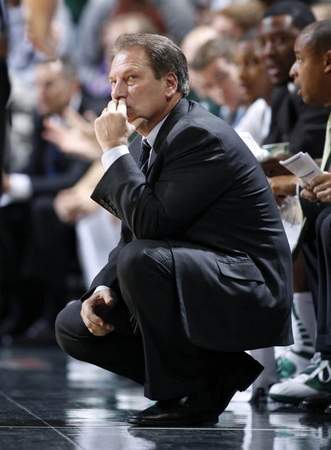
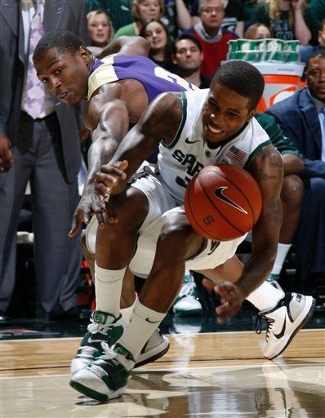
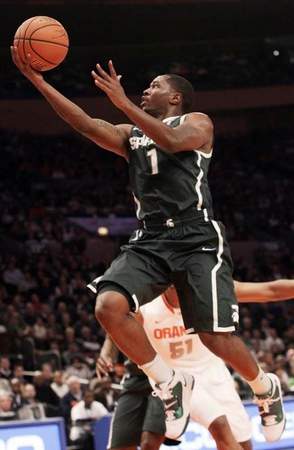
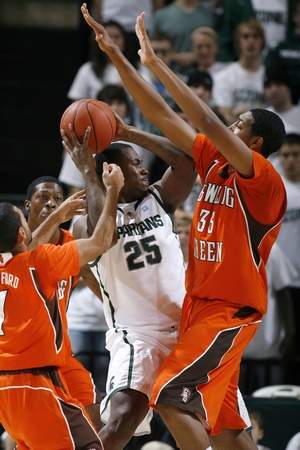
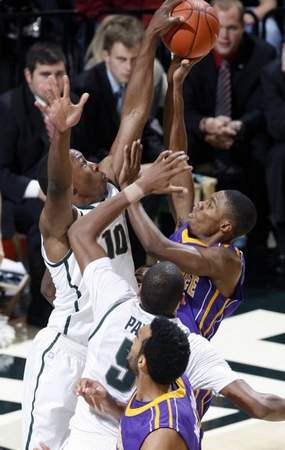

on 22 Dec 2010 at 12:41 pm # Tweets that mention Longhorn Road Trip » Longhorns face big challenge in Spartans -- Topsy.com
[…] This post was mentioned on Twitter by Texas Longhorns Buzz and Ryan Clark. Ryan Clark said: Big, big game for the #Horns against Michigan State in East Lansing tonight. Preview it with LRT: http://ow.ly/3ti21 […]